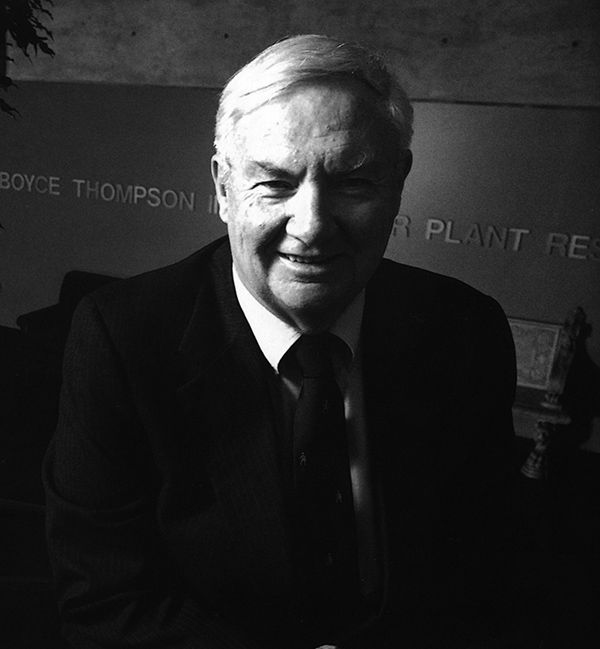Plant scientist Ralph Hardy, who led GMO foods debate, dies
By H. Roger Segelken

Ralph W.F. Hardy, a biochemist who called for better biotechnology research and scientific transparency as the controversy over genetically modified foods made headlines, died Aug. 2 in Wilmington, Delaware, at age 82.
Hardy was the founding director of the North American Agricultural Biotechnology Council (NABC), a 20-member consortium of American and Canadian research universities and government agencies. He was also president and CEO of the Cornell-affiliated Boyce Thompson Institute, from 1986 to 1995, and a research biochemist at DuPont, from 1963 to 1984, where he engineered the firm’s move into life sciences technology.
As a spokesman for university-based biotechnology research, Hardy never missed an opportunity to testify to Senate and House committees, and to cultivate public understanding of agricultural biotechnology through the media.
NABC conferences and publications became a forum for critics of genetically modified foods, like Ralph Nader, as well as research scientists and policy makers. “The media has a huge appetite for biotechnology stories,” Hardy said in 2015. “Nowadays scientists need more than ever to devote time to non-laboratory functions. Guidance and vision to help society understand the realistic benefits and risks of their activities – without jargon – is a necessity.”
Ralph Wilbur Frederick Hardy was born July 27, 1934, in Lindsay, Ontario, Canada. He studied at the University of Toronto (master’s in 1958) and the University of Wisconsin-Madison (doctorate in 1959).
As a corporate biochemist, Hardy pioneered nitrogen fixation research, and was noted for developing the so-called acetylene reduction assay for nitrogenase activity in crop plants. Under Hardy’s leadership, the NABC issued reports on such topics as labeling of foods with genetically modified ingredients and management practices for field trials of bioengineered plants.
Before joining the research staff at DuPont, Hardy served on the faculty of the University of Guelph, Ontario, where he received an honorary doctor of science degree in 1997. He was president of Bio Technica International in Cambridge, Massachusetts from 1984 to 1986.
Boyce Thompson Institute President and CEO David Stern said Hardy “was dynamic and visionary, realizing the impact that plant molecular biology would have on agriculture and human health in the coming decades. He also fostered a vigorous dialogue around agricultural biotechnology, grounded in the firm belief that the best public policy is created from diverse, science-based perspectives.”
Hardy is survived by his wife, Jacqueline, three sons, a daughter, eight grandchildren and one great-grandchild.
Funeral services will take place Saturday, Aug. 13, at 1 p.m. at Oakwood United Church in Oakwood, Ontario.
H. Roger Segelken is a freelance writer.
Media Contact
Get Cornell news delivered right to your inbox.
Subscribe